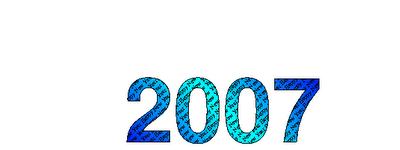Over a period of time, it seems like a layer of dust covers your deep understanding and knowledge of a subject matter, where in once I was considered an expert. My knowledge is rusting and it's time to re-read some old classics and books I used to learn the subject matter from.
I've been trying to learn C#, Python, etc, but I realize that I need to revisit my C skills and my C99 knowledge base again. In summary, knowledge rusts over a period of time, specially the items not practiced very often.
Get ready to clear away the dust from your rusting areas as well, as I explore well known areas and newer areas with a "I used to know, but forgot" perspective.
Saturday, December 29, 2007
Monday, December 24, 2007
Digging out of history (longjmp is bad)
I had this program written out a long time back, it shows why some constructs are valid, but do not apply well today. In the evolution of C++, we've left behind some holes
1 #include <stdio.h>
2 #include <setjmp.h>
3 #include <string.h>
4
5 class C {
6 private:
7 char *ptr;
8 public:
9 C (const char *name) {
10 ptr = new char[strlen(name)+1];
11 printf("constructed C\n");
12 }
13
14 ~C () {
15 delete [] ptr;
16 printf("destroyed C\n");
17 }
18 };
19
20 void funfunction(jmp_buf env)
21 {
22 C c("Hello");
23 /*
24 * Do something, at the end expect destructor to be
25 * called
26 */
27 longjmp(env, 1);
28 }
29
30 int main(void)
31 {
32 jmp_buf env;
33 int ret;
34
35 ret = setjmp(env);
36 if (ret) {
37 printf("Looks like we jumped a long way\n");
38 return ret;
39 }
40
41 funfunction(env);
42 return 0;
43 }
See if you can find the obvious problem with this code
1 #include <stdio.h>
2 #include <setjmp.h>
3 #include <string.h>
4
5 class C {
6 private:
7 char *ptr;
8 public:
9 C (const char *name) {
10 ptr = new char[strlen(name)+1];
11 printf("constructed C\n");
12 }
13
14 ~C () {
15 delete [] ptr;
16 printf("destroyed C\n");
17 }
18 };
19
20 void funfunction(jmp_buf env)
21 {
22 C c("Hello");
23 /*
24 * Do something, at the end expect destructor to be
25 * called
26 */
27 longjmp(env, 1);
28 }
29
30 int main(void)
31 {
32 jmp_buf env;
33 int ret;
34
35 ret = setjmp(env);
36 if (ret) {
37 printf("Looks like we jumped a long way\n");
38 return ret;
39 }
40
41 funfunction(env);
42 return 0;
43 }
See if you can find the obvious problem with this code
Saturday, December 22, 2007
Sounds in my life
The gentle and shrill sounds in my everyday life, call my attention to them. In earlier days, the only sound that one would hear is of people talking to them, children playing on the street or a baby calling for Mama's attention.
Compare and contrast that with what we hear today; the sound of the TV, the microwave, radio, music player, sound of vehicles zooming on the street, vehicles blowing horns, the telephone, the cell phone trying to tell you someone wants to talk to you (even when you are in the restroom), this someone could be a pre-recorded sales call; the computer buzzing to tell you that someone is trying to reach you through instant chat, the courier person ringing the doorbell, the alarm-clock ringing on my cell phone
How am I supposed to listen to myself and others around me; with these distracting sounds calling for my attention. We have moved into a new era, where we need more sounds to tell us, that we are needed elsewhere. I need to filter these sounds, so that I can hear my heart-beat, the pin-drop and my those around me giggle and laugh.
Compare and contrast that with what we hear today; the sound of the TV, the microwave, radio, music player, sound of vehicles zooming on the street, vehicles blowing horns, the telephone, the cell phone trying to tell you someone wants to talk to you (even when you are in the restroom), this someone could be a pre-recorded sales call; the computer buzzing to tell you that someone is trying to reach you through instant chat, the courier person ringing the doorbell, the alarm-clock ringing on my cell phone
How am I supposed to listen to myself and others around me; with these distracting sounds calling for my attention. We have moved into a new era, where we need more sounds to tell us, that we are needed elsewhere. I need to filter these sounds, so that I can hear my heart-beat, the pin-drop and my those around me giggle and laugh.
Thursday, November 22, 2007
Guess what OS Don Knuth runs?
Check out http://www-cs-faculty.stanford.edu/~knuth/news.html
In the section "Wanted: A Name For High-Tech Grief" Knuth states and I quote
"I myself have often cried out for help to colleagues who have generously made house calls, in order to unwedge my highly customized Linux system"
We've known it for a while, looking at the customized fvwm2 configuration on Knuth's website, but it's good to see it in writing.
Some of you must be thinking, he has problems with Linux? We'll look at the keywords -- highly customized. Can't do that with other operating systems without hitting yourself in the head a few times or hitting your head against something. You don't hit yourself because your stupid, you do, because you brought the product :-)
Hmmm.... Now, if we can get everyone who has directly or in-directly been benefited from Knuth's work to run Linux, that would be a wonderful starting place. Of-course regular users are more than welcome to adopt and customize Linux.
Linux is a Trademark of Linus Torvalds
In the section "Wanted: A Name For High-Tech Grief" Knuth states and I quote
"I myself have often cried out for help to colleagues who have generously made house calls, in order to unwedge my highly customized Linux system"
We've known it for a while, looking at the customized fvwm2 configuration on Knuth's website, but it's good to see it in writing.
Some of you must be thinking, he has problems with Linux? We'll look at the keywords -- highly customized. Can't do that with other operating systems without hitting yourself in the head a few times or hitting your head against something. You don't hit yourself because your stupid, you do, because you brought the product :-)
Hmmm.... Now, if we can get everyone who has directly or in-directly been benefited from Knuth's work to run Linux, that would be a wonderful starting place. Of-course regular users are more than welcome to adopt and customize Linux.
Linux is a Trademark of Linus Torvalds
Tuesday, November 06, 2007
FOSS.IN delegate registration is open
Register at http://foss.in/2007/register/delegates/
The fee structure has changed this year. Do read the details before registering. This year we have project days and the main conference
Saturday, November 03, 2007
Talk at VTU
I gave a talk on Introduction to Operating Systems via EDUSAT. The lecture was broadcast to several universities via satellite. I had no live audience, but it was fun to speak into a camera. The video has been stored/archived for students to see later.
Here's a link to the slides
Here's a link to the slides
New Code in the Linux Kernel
I got some new code included into the mainline linux 2.6.24-rc1 kernel
cgroupstats - Is an infrastructure to allow sending control group statistics to user space using taskstats/genetlink
cpu_acct - CPU accounting subsystem for control groups
Worked on some other miscellaneous stuff as well. Overall, 2.6.24 was an interesting merge cycle, lots of new stuff went it. Check it out! Please do report regressions
cgroupstats - Is an infrastructure to allow sending control group statistics to user space using taskstats/genetlink
cpu_acct - CPU accounting subsystem for control groups
Worked on some other miscellaneous stuff as well. Overall, 2.6.24 was an interesting merge cycle, lots of new stuff went it. Check it out! Please do report regressions
A Quick Estimate
I was trying to estimate how long it would take for a timer, measured in nano-seconds using 64 bits would take to roll over. Here's my quick estimate
It would take 2^64/10^9 seconds = 2^64/2^9*5^9
Approximating on all calculations
= 2^55/5^9
5^3 = 125 ~= 2^7
5^9 = 2^21
= 2^55/2^21
= 2^34 seconds
2^34 seconds = 2^34/86500 days ~= 2^34/80*2^10 = 2^24/2^6 days = 2^18 days
1 year = 365 days, 3 years ~= 2^10 days
That leaves us with 2^8 years * 3 years
= 256*3 years before the timer overflows
With a machine, usually one would expect at-least one reboot in 800 years, if so, we would be fine for a long time to come.
See I need no calculator :-)
It would take 2^64/10^9 seconds = 2^64/2^9*5^9
Approximating on all calculations
= 2^55/5^9
5^3 = 125 ~= 2^7
5^9 = 2^21
= 2^55/2^21
= 2^34 seconds
2^34 seconds = 2^34/86500 days ~= 2^34/80*2^10 = 2^24/2^6 days = 2^18 days
1 year = 365 days, 3 years ~= 2^10 days
That leaves us with 2^8 years * 3 years
= 256*3 years before the timer overflows
With a machine, usually one would expect at-least one reboot in 800 years, if so, we would be fine for a long time to come.
See I need no calculator :-)
Saturday, October 27, 2007
FOSS.IN list of talks announced
Check out http://foss.in/2007/shortlist.php
The list of talks looks really good and I know a lot of people presenting at FOSS.IN. I am co-presenting on one topic. I'd say this year FOSS.IN is going to rock, so make sure your there.
The list of talks looks really good and I know a lot of people presenting at FOSS.IN. I am co-presenting on one topic. I'd say this year FOSS.IN is going to rock, so make sure your there.
Monday, October 08, 2007
India vs Australia (quick analysis)
India won the T20 world cup and became champions! The 50-50 games seem to be a different playing ground for the Indian Team. Have you been wondering why India did not fair so well, so far. Here's a quick layman analysis
Here's some advice for the Indian Team (given that Dhoni reads cricinfo, you never know if he might read this blog as well :-) )
- India have not been batting first, in all the T20 matches we won, we batted first!
- The team has changed and so have the rules. Instead of a powerplay for 20 overs with catch in fielders around, T20 has restrictions for just 4 overs. This makes a big difference to players like Sehwag and Gambhir, who I think are more suited to the field being well spread out (survive longer)
Here's some advice for the Indian Team (given that Dhoni reads cricinfo, you never know if he might read this blog as well :-) )
- Convert the 50-50 match to a 20-20 match, by keeping wickets in hand till the 30th over
- While batting second, get Dhoni in at #3, followed by Yuvraj at #4
- Get Dravid to Open the batting while chasing
- Tendulkar should come 4/5 down while chasing (when there is a mandatory ball change)
- Don't ever get Yuvraj to Bowl :-)
- While bowling first, attack aggressively, even if it means that more runs will be conceded
Friday, October 05, 2007
Memory Ordering (Recommended Reading)
I just finished reading this wonderful report on memory ordering. I highly recommend reading it. If you have anything to do with multi-core, multi-processor, parallel programming, you'll find the paper very insightful.
Other good to read papers/articles on memory ordering from Paul Mckenney are
Other good to read papers/articles on memory ordering from Paul Mckenney are
- C++ Data-Dependency Ordering. May 2007.
- Overview of Linux-Kernel Reference Counting. January 2007.
- A simple and efficient memory model for weakly ordered architectures. Makes case for weakly ordered primitives in programming languages. Updated May 2007.
Wednesday, September 26, 2007
Doing the simple things first
I've always been lost trying to understand and do the complex things. I just realized that I miss out on doing and enjoying the simple things in life. Note to self, remember this and change.
Tuesday, September 25, 2007
India are Twenty20 champs
No one expected it, but secretly hoped for it; and it has happened. India are twenty 20 world cup champions. Boy, has this been a good time for sports. For those of you who do indeed know that hockey is our national game, spare a moment for this picture as well
Spare some time and visit http://www.bharatiyahockey.org/ and http://www.indianhockey.com/.
Now shifting back to twenty20, India beat Pakistan twice and the second win won us the cup. Both matches were close, nail biting (warning: watch your hygiene) finishes. Surprisingly, India got extremely lucky and batted first in almost all their encounters which they won. The statistics show a remarkable quality, that has been missing before, this was a true team effort. Everybody chipped in; in the batting department, we had contributions from Gautham Gambhir, Virendra Sehwag, Robin Uttapa, Yuvraj Singh, M. S. Dhoni, Rohit Sharma (who incidentally is yet to be dismissed in this form of the game). Karthik was a weak spot in the team, but boy did he keep well in the game against South Africa. In the bowling department, R. P. Singh, Irfan Pathan, Harbhajan Singh and Sreesanth were the key contributors.
India's fielding has been quite good, thanks to the absence of Saurav Ganguly, V.V.S. Laxman and Munaf Patel.
I am sure Dhoni is thinking मै तो युहीं चाला था बिना जाने मंज़िल मगर लोग आते गये और कारवाँ बंता गया |
Well done, keep up the good work boys!
Tuesday, September 11, 2007
Containers update - more photos
The containers team - catching up in Cambridge
There is a containers update at http://community.livejournal.com/openvz/17964.html
More interesting math
I came across the The Encyclopedia of Integer Sequences and the really interesting web site on Mathematical Constants. I am currently reading A Passion for Mathematics by Clifford A. Pickover .
Sunday, September 09, 2007
Friday, September 07, 2007
Kernel Summit Photos - taken by Evgeniy Polyakov
Peter Zijlstra, Ingo Molnar, Venki Pallipadi and Balbir Singh in discussion
More photos will follow, including the group photo. Meanwhile, there are other photos at Evgeniy Polyakov's gallery.
Thursday, September 06, 2007
Kernel summit day 1 updates
Gerrit has some wonderful updates in his blog Linux and Open Source. LWN.net subscribers can read the summit update at 2007 Kernel Summit article right away or wait for a week for it to be available to public.
Friday, August 31, 2007
Off to VM and Kernel Summit
I've been invited to the VM (Virtual Memory) Summit in Cambridge, U.K. I will also be attending the Kernel Summit which is being held along side LinuxConf Europe 2007. Hopefully, I'll have interesting notes and pictures when I am back.
Algorithms dictionary online
http://www.nist.gov/dads/terms.html is a wonderful dictionary of terms and concepts in Algorithms. It's a wonderful dictionary and the references are excellent. I wish they made the content available as a book or a PDF document.
Monday, August 20, 2007
Perl module for taskstats
Way back last year, we developed the taskstats and delay accounting interface for the Linux Kernel. There is now a CPAN module to extract the same information using perl (all our example programs are in C). It's called Linux::Taskstats::Read. It can read the binary dump of taskstats information and interpret it.
Here's the module
I hope to be able to write a python interface for taskstats as well and do it quickly. I am sure someones already done the work.
Here's the module
I hope to be able to write a python interface for taskstats as well and do it quickly. I am sure someones already done the work.
Friday, August 17, 2007
Celebrating 50 years of IBM Technical Journals
" Since the first publication of the IBM Journal of Research and Development in 1957 and the IBM Systems Journal in 1962, these Journals have provided descriptions and chronicles of many important advances in information technology and related topics ranging from atoms to business solutions. To celebrate the 50th anniversary of the IBM Journals, this report highlights a selection of significant papers published in the Journals, along with brief commentaries. The Journal editors chose papers which were very highly cited in the technical literature, described technologies of historic significance, or provided an important overview of a field"
Get the articles at 50 Years of IBM Technical Journals
Get the articles at 50 Years of IBM Technical Journals
Thursday, August 02, 2007
An LWN.net article about my work
LWN is covering my memory controller work this week. The article is subscriber only, but I've managed to get a free link (legally of-course). Please do view the article, the work and consider subscribing to LWN.net
Here's the article Controlling memory use in containers
Here's the article Controlling memory use in containers
Thursday, July 12, 2007
This week from the Wikipedia
I've just discovered my favourite Wikipedia page for this week. It's the page on problem solving. Don't wait, go ahead and read it!
I highly recommend glancing through the external links and reading them later at leisure.
I highly recommend glancing through the external links and reading them later at leisure.
Monday, July 02, 2007
Balbir's Blog: OLS2007 Proceedings Available
Balbir's Blog: OLS2007 Proceedings Available
Jon Corbet was kind enough to mention my presentation in his slides. Check out http://lwn.net/talks/ols2007/img44.html
Thanks, Jon!
Jon Corbet was kind enough to mention my presentation in his slides. Check out http://lwn.net/talks/ols2007/img44.html
Thanks, Jon!
Sunday, July 01, 2007
OLS2007 Proceedings Available
You can download them at
https://ols2006.108.redhat.com/2007/Reprints/
Download both the volumes, my papers are all in volume 2.
https://ols2006.108.redhat.com/2007/Reprints/
Download both the volumes, my papers are all in volume 2.
Saturday, June 30, 2007
OLS presentation
I just finished my first OLS presentation on Containers: Challenges with Memory Resource Controller and Its Performance
The presentation went well, it's all been recorded. Hopefully the proceedings will show up soon.
The presentation went well, it's all been recorded. Hopefully the proceedings will show up soon.
Friday, June 22, 2007
Off to Ottawa Linux Symposium
I am off to the Linux Symposium in Ottawa, I was supposed to travel to Linux Symposium Japan, but could not (unfortunately!)
You can catch me at the following events
You can catch me at the following events
Wednesday, June 20, 2007
M.S. Thesis
M.S.Thesis available
I've finished my M.S. Thesis and you can find it here NOTE: The thesis might still have errors and I do not have any immediate plans of fixing the errors. The thesis was typeset using LaTeX. Hopefully, you'll enjoy reading it.The figures require some fixing, hopefully, I'll redo them in MetaPost later.
Monday, June 18, 2007
MS (Software Systems)
I received my MS degree from BITS Pilani today. Wow! I am now qualified to do more, I feel so energized. As I am writing this blog, I look at the pile of books of my M.S. curriculum and the dissertation report of the final semester. Flashing in front of my eyes are my last minute attempts to read up a whole book in a week, my stupidity in believing that an open book examination can be passed by carrying along enough books.
Anyhow, that is the past and I learnt a lot from it. As I sit here and examine the past, I know that the process of learning never ends, but learning the same thing is rarely fun (a.k.a repeating your mistakes). But as my copy of Don Knuth's The Art of Computer Programming tells me, I'll never learn anything at once, I'll need to learn somethings during the next reading; I realize that I've just completed a small milestone in a long journey.
Anyhow, that is the past and I learnt a lot from it. As I sit here and examine the past, I know that the process of learning never ends, but learning the same thing is rarely fun (a.k.a repeating your mistakes). But as my copy of Don Knuth's The Art of Computer Programming tells me, I'll never learn anything at once, I'll need to learn somethings during the next reading; I realize that I've just completed a small milestone in a long journey.
Thursday, May 24, 2007
TUGboat archives
I recently rediscovered the TUGboat archives
There is a really interesting article in the 2007 archives
"A beginner's guide to METAPOST for creating high-quality graphics", the article points to a metapost previewer at
http://www.tlhiv.org/cgi-bin/MetaPostPreviewer/index.cgi
Any newbie experimenting with MetaPost should use the previewer, it's fun and easy and of-course one need not worry about the installation details.
Part of the inspiration for looking up TUGboat came from Kevin Larson's article on the Technology of Text. The article is well written, but it completely ignores TeX and METAFONT. That reminds me, time for a letter to the editor.
There is a really interesting article in the 2007 archives
"A beginner's guide to METAPOST for creating high-quality graphics", the article points to a metapost previewer at
http://www.tlhiv.org/cgi-bin/MetaPostPreviewer/index.cgi
Any newbie experimenting with MetaPost should use the previewer, it's fun and easy and of-course one need not worry about the installation details.
Part of the inspiration for looking up TUGboat came from Kevin Larson's article on the Technology of Text. The article is well written, but it completely ignores TeX and METAFONT. That reminds me, time for a letter to the editor.
Thursday, April 19, 2007
Blog in Hindi
अब मै हिन्दी मे भी ब्लोग कर सकता हूँ !
If you cannot see this well, check out
Wikipedia Article on Indic Fonts
and
Blogger help for Hindi
If you cannot see this well, check out
Wikipedia Article on Indic Fonts
and
Blogger help for Hindi
Monday, April 16, 2007
Balbir's Blog: It's prediction time!
Balbir's Blog: It's prediction time!
I am so excited and in pain to see prediction 5 of this years prediction come true! I am curious to see how the others will turn out :-)
I am so excited and in pain to see prediction 5 of this years prediction come true! I am curious to see how the others will turn out :-)
Saturday, March 24, 2007
Reserving space for my good bye to the Indian Cricket Masters
Dravid, Ganguly, Tendulkar should go now! Dravid and Tendulkar must go for sure and so should Mr Greg C. Let's see how the Indian team responds to this defeat.
Thursday, March 01, 2007
Balbir's log 1st March 2007
- Read a very interesting algorithm called the Ford-Johnson method for sorting. I ended up opening Knuth's Volume 3: Sorting and Searching and reading through his quite amazing illustration and explanation of the method.
- References - Don Knuth, vol 3, 3rd Edition, Page 184
- Horowitz and Sahni, Fundamentals of Computer Algorithms
- Read through the introduction in the Algorithms book by Papadimitriou, et.al. See my post on a fun way to multiply numbers
- Played around with the python programming language after a big break
Follow up: A fun way to multiply numbers
Here's python code to multiply numbers as mentioned in the A fun way to multiply numbers blog entry.
NOTE: I am not a python expert, so there could be some obvious bugs in this simple piece of code. As always use at your own risk.
NOTE: I am not a python expert, so there could be some obvious bugs in this simple piece of code. As always use at your own risk.
print "Input the first number"
a=input()
print "Input the next number to be multiplied with %d" %a
b=input()
res=0
while a:
if a & 0x1:
res = res + b
a = a >> 1
b = b << 1
print "The result is %d\n" %res
A fun way to multiply numbers
Reading through the algorithms book by Papadimitriou, et. al has been great fun. I learn a great fun way to multiply (apparently known from ancient times). Let's say we intend to multiply 13 and 23, the procedure is quite straight forward. Write down 13 and 23 besides each other
| 13 | 23 |
| 6 | 46 |
| 3 | 92 |
| 1 | 184 |
The first column is divided by two (with rounding) and the second one is multiplied by two
| 13 | 23 |
| 6 | 46 |
| 3 | 92 |
| 1 | 184 |
Strike out the numbers with even numbers in the first column
Now we just add up the numbers in the right column to obtain 299. That's quite easy right? The really cool thing about this approach is that is easy to implement using computers (hint: left shift and right shift multiply and divide the number by 2 (with rounding taken care of))
Balbir's log - 28th Feb 2007
- Freshly installed FC6 - 32 bit edition, still in the process of setting it up (another blog entry). I hope to get KVM and UML running
- Played around with Linux's Connector interface (kernel <-> user communication)
- Read through chapter 5 (partially) of Computer Systems Performance Evaluation and Prediction
Tuesday, February 27, 2007
Balbir's log - 27 Feb 2007
- Played around with Scilab, used scilab for some simple signal processing work, Amplitude Modulation.
- I've started reading a paper on VM entitled Making LRU friendly to weak locality workloads
- Added Markov chains to my to-learn list
Saturday, February 24, 2007
Using maxima -- baby steps
The use of symbolic computing makes it easy to visualize and solve problems that were otherwise dry and would put you to sleep. To test the simplicity of a freely available tool called maxima, I tried to solve a common problem with it.
The problem is quite simple, remember high school physics? Well I don't :-). Consider a tuning fork, which oscillates and produces a sound (depending on it's frequency).
We start by entering the mathematical model of the fork
'm*diff(x(t), t, 2)=-k*x(t);
Maxima prints

We now request maxima to solve the equation for us by
desolve([%],[x(t)]);
Maxima asks
Is k * m positive, negative, or zero? We say positive
Maxima prints

We ask maxima to simplify the result for us
radcan(%);
Maxima outputs

That's it, we have our solution.
The problem is quite simple, remember high school physics? Well I don't :-). Consider a tuning fork, which oscillates and produces a sound (depending on it's frequency).
We start by entering the mathematical model of the fork
'm*diff(x(t), t, 2)=-k*x(t);
Maxima prints

We now request maxima to solve the equation for us by
desolve([%],[x(t)]);
Maxima asks
Is k * m positive, negative, or zero? We say positive
Maxima prints

We ask maxima to simplify the result for us
radcan(%);
Maxima outputs

That's it, we have our solution.
Tuesday, January 30, 2007
What have I been upto?
I've spread myself quite thin, with a lot of code to write, books to read, things to buy and documentation to write.

For now, I have started reading Structure and Interpretation of Computer Programs. I've started reading it, don't skip the foreword or the preface. Be patient with the author and go read it, it's fun!
Meanwhile, I hope to get back to productive coding soon, instead of just reading hundreds and hundreds of papers.
For now, I have started reading Structure and Interpretation of Computer Programs. I've started reading it, don't skip the foreword or the preface. Be patient with the author and go read it, it's fun!
Meanwhile, I hope to get back to productive coding soon, instead of just reading hundreds and hundreds of papers.
Tuesday, January 23, 2007
One of the hardest problems software faces today
I think the biggest problem is to get users to read the documentation associated with the software.
Try answering these questions and score yourself.
The answers to these questions might not be a simple yes or no, but it will give you a fair idea of how we programmers are lazy and totally ignore documentation.
Try answering these questions and score yourself.
- How many times have you seen a question about a problem being repeated?
- Why do you they created FAQs?
- How many FAQs have you read?
- What was the last release notes you read?
- Which book did you read last (not related to your course)?
- What new techniques did you read and discover in the last two years?
- What kind of documentation did you write and share for your last project?
- What was the last software manual you read?
- What was the ratio of comments to code in
- Programs you wrote
- Programs you read
The answers to these questions might not be a simple yes or no, but it will give you a fair idea of how we programmers are lazy and totally ignore documentation.
Sunday, January 14, 2007
Some pictures from our New year and Lohri celebration (A Story!)

Me and my gorgeous wife before we left for the new year party
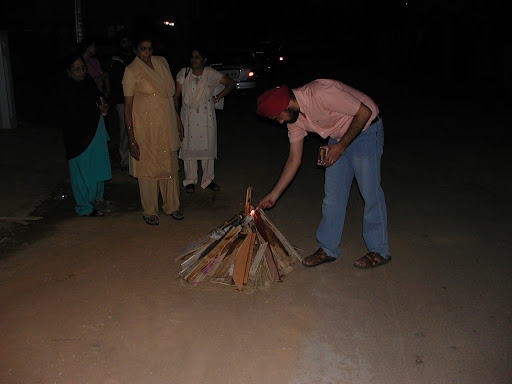 I sparked off the Lohri celebrations
I sparked off the Lohri celebrations
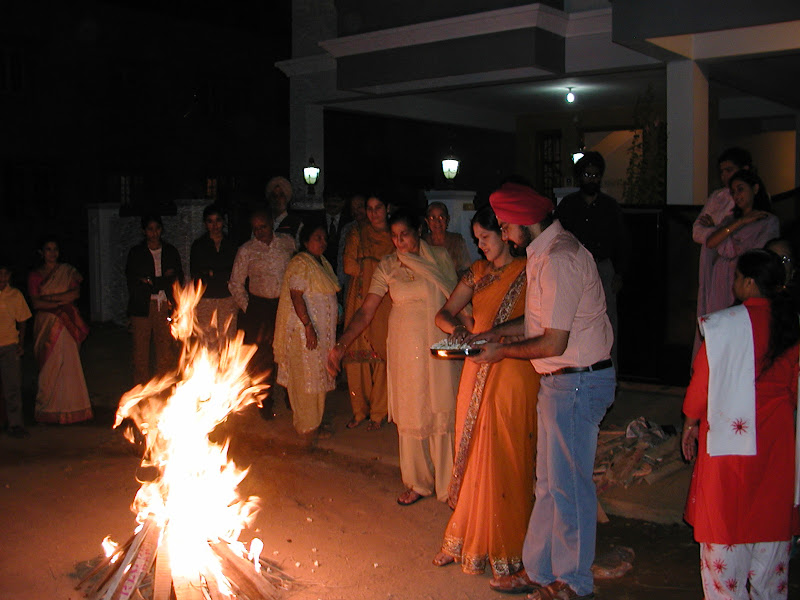 Popcorn and Peanuts in fire
Popcorn and Peanuts in fire
A Lohri ritual
 I sparked off the Lohri celebrations
I sparked off the Lohri celebrations Popcorn and Peanuts in fire
Popcorn and Peanuts in fireA Lohri ritual
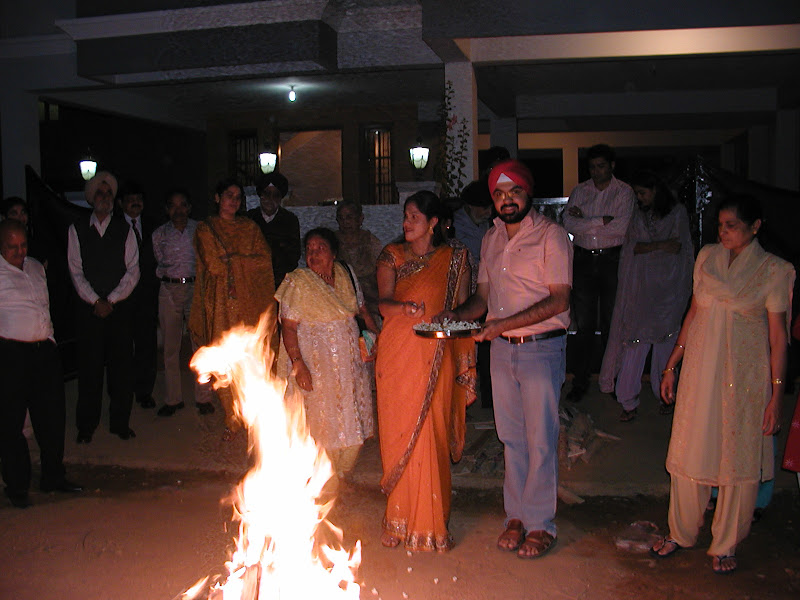
The flames got higher, lohri had now begun
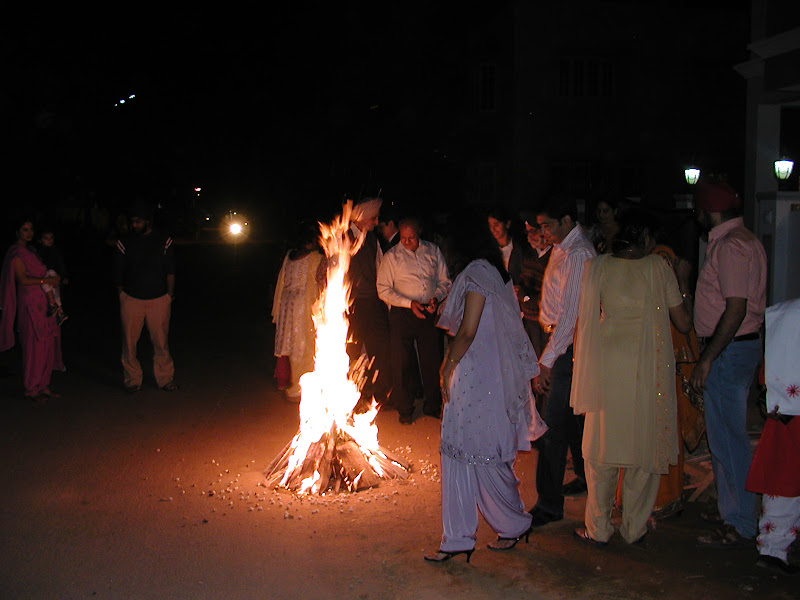 Ritual walk around the fire
Ritual walk around the fire
 The crowd got bigger as the flames got higher
The crowd got bigger as the flames got higher
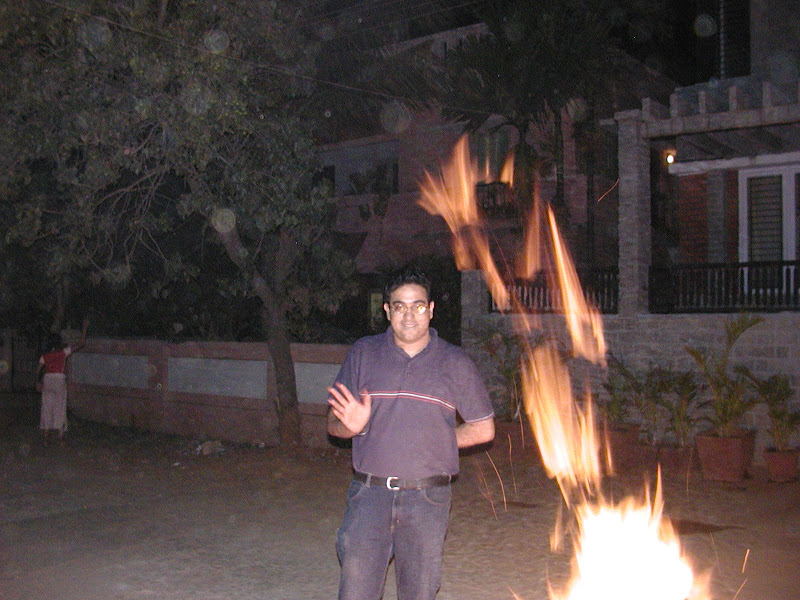 My brother enjoyed the heat
My brother enjoyed the heat
 My in-laws got involved as well
My in-laws got involved as well
(My brother-in-law, his wife and son)
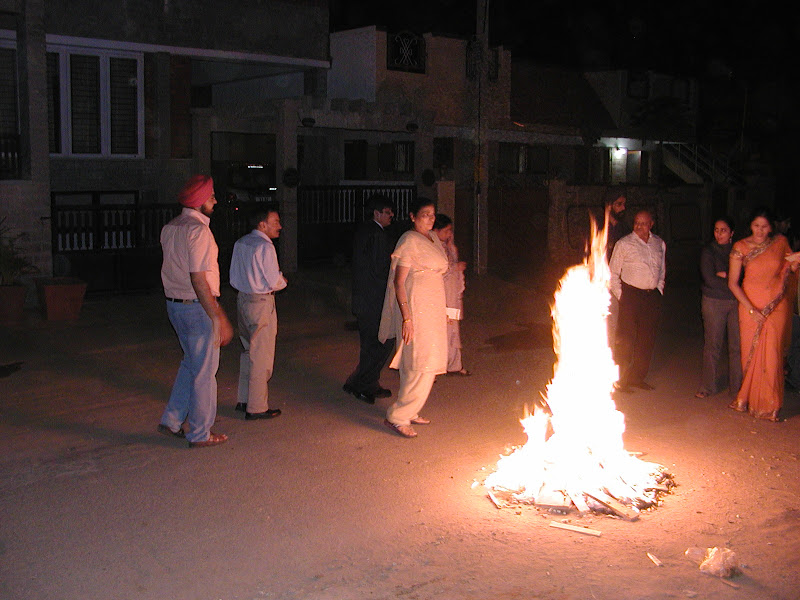 I had to keep encouraging people
I had to keep encouraging people
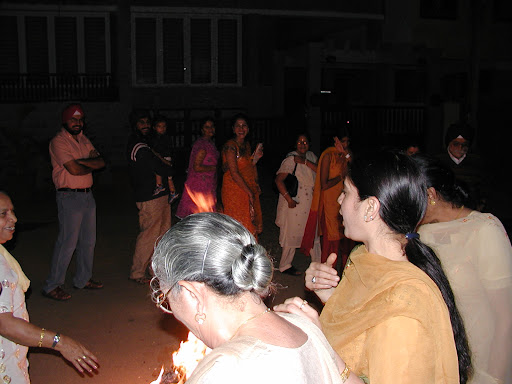 The last round
The last round
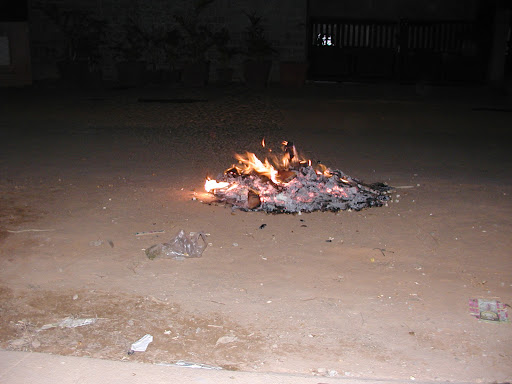 There was only so much firewood!
There was only so much firewood!
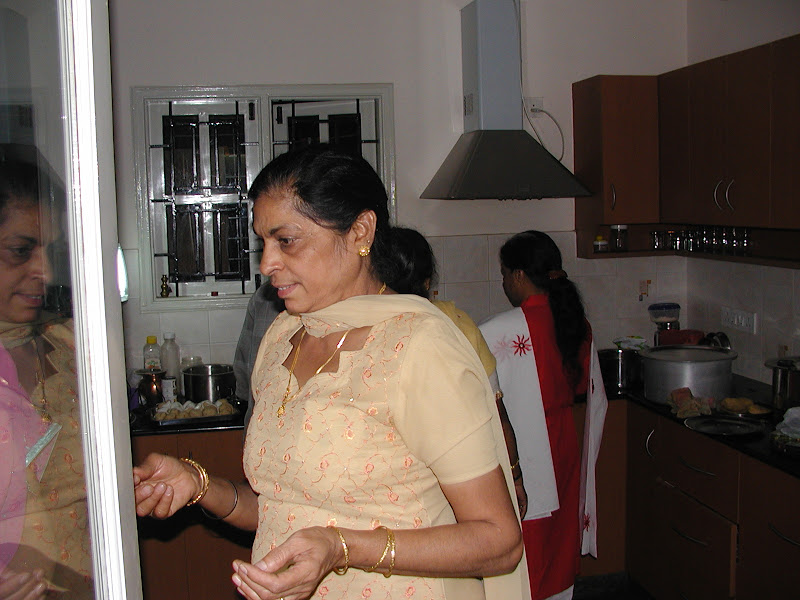 It was time for dinner
It was time for dinner
(The chef was ready!)
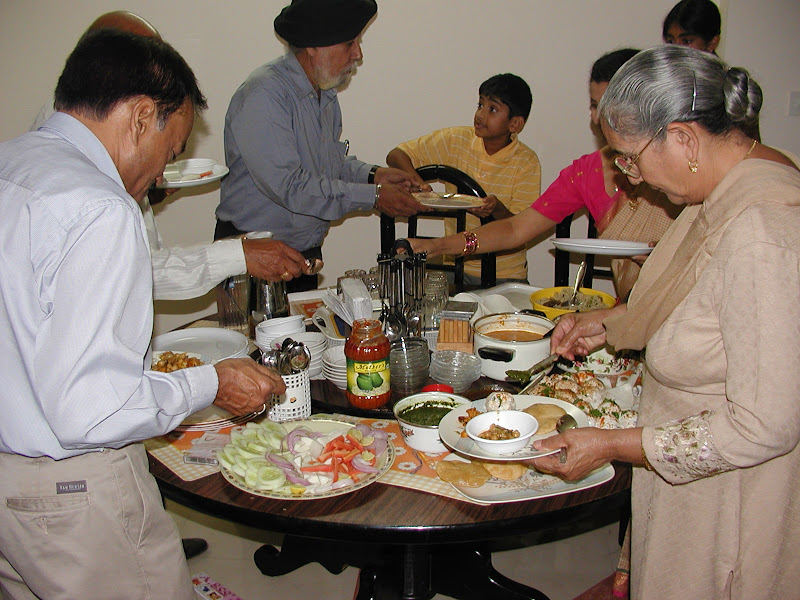 Dinner was served, the food was awesome!
Dinner was served, the food was awesome!
 My wife's nephew, he came, he saw
My wife's nephew, he came, he saw
 He bowed!
He bowed!
 Ritual walk around the fire
Ritual walk around the fire The crowd got bigger as the flames got higher
The crowd got bigger as the flames got higher My brother enjoyed the heat
My brother enjoyed the heat My in-laws got involved as well
My in-laws got involved as well(My brother-in-law, his wife and son)
 I had to keep encouraging people
I had to keep encouraging people The last round
The last round There was only so much firewood!
There was only so much firewood! It was time for dinner
It was time for dinner(The chef was ready!)
 Dinner was served, the food was awesome!
Dinner was served, the food was awesome! My wife's nephew, he came, he saw
My wife's nephew, he came, he saw He bowed!
He bowed!Saturday, January 13, 2007
Happy Lohri
Mufli ki khusbu, gurh ki mittaas
Makki ki roti aur sarson ka saag
Dil ki kushi aur apno ka pyar
Mubarak ho apko Lohri ka thyohar!
If the whole thing bounced over you, see http://www.lohrifestival.org/. We are celebrating our first Lohri
Makki ki roti aur sarson ka saag
Dil ki kushi aur apno ka pyar
Mubarak ho apko Lohri ka thyohar!
If the whole thing bounced over you, see http://www.lohrifestival.org/. We are celebrating our first Lohri
Friday, January 12, 2007
Article: A Conversation with John Hennessy and David Patterson
Read A Conversation with John Hennessy and David Patterson published in ACM Queue. It's one of the best articles, I've read lately. They talk about the challenge with parallelism, the free ride software has had, their new book, new projects and much more.
I highly recommend reading the article
I highly recommend reading the article
Sunday, January 07, 2007
It's prediction time!
It's come a little late this year, but here goes anyway. The list includes technology, business and other predictions for the year 2007
These predictions are not very scientific, they are based on gut feeling. Feel free to comment on any of the predictions. I'll try and keep the list up to date or add your predictions if I really like them
- Apple will go back to using the PowerPC
- Intel will gain an upper hand over AMD in the 64 bit space
- Microsoft (R) Vista (TM) will not be widely accepted, people will expect too much from it
- Internet Explorer 7 will do well, but will begin to loose out gradually towards the end of the year
- India, Dravid, Chappel and Tendulkar will have a rather forgivable (we'll loose out before the semi-finals) world cup
- The world will get ready to move to 128 bit computing, there will be rapid growth towards 1024 bit computing machines
- Adobe, Google and Apple will continue to do well
- Open source movement will slow down for this year
These predictions are not very scientific, they are based on gut feeling. Feel free to comment on any of the predictions. I'll try and keep the list up to date or add your predictions if I really like them
Monday, January 01, 2007
Have A Great New Year!
Subscribe to:
Comments (Atom)
privacy
Some of the policy from the app automation refers to https://rclone.org/privacy/ if you are a general blog reader, follow Google's polic...
-
(Photo from http://content-usa.cricinfo.com/indvaus2008/content/current/player/28114.html) Dravid's dismal form continues in test crick...
-
I've been a big fan of Skiena's Algorithm Design Manual , I recently found my first edition of the book (although I own the third ed...
-
The book is almost out there . There is code and selected solutions as well. The book is supposed to be in full colour from what I heard....
